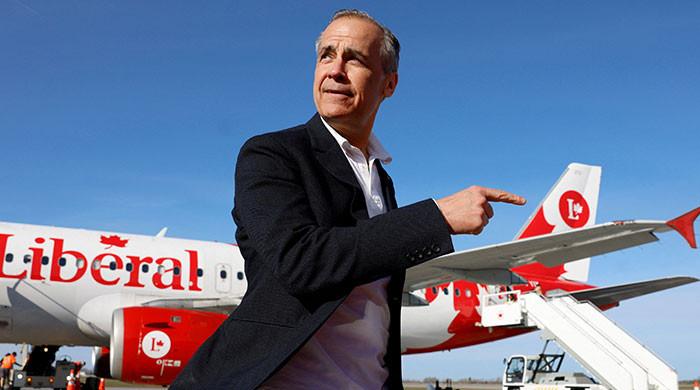Ottawa: Canadian Prime Minister Mark Carney obtained a key political victory on Monday after his liberal party won the Canada elections.
Carney, who has a history of roles at difficult times, has obtained a mandate as Prime Minister despite the fact that he has never served in Parliament, which is unprecedented in Canadian history.
“I am very useful in a crisis. I am not so good in peacetime,” he said during the campaign.
Carney obtained a mandate as Prime Minister despite the fact that he has never served in Parliament, which is unprecedented in Canadian history.
Even without any experience of the government, he convinced the voters that his history dealing with financial unrest equipped him to lead Canada through the trade war of US President Donald Trump.
A 60-year-old father of four married children, Carney was born near the Arctic in Fort Smith, in the territories of northwest Canada, but was raised in the west city of Edmonton.
Like many Canadians, he has played hockey in his youth. He studied in Harvard in the United States and Oxford in England and made a fortune as an investment banker at the start of his career at Goldman Sachs, working in New York, London, Tokyo and Toronto.
Carney then joined the Canadian Public Service, finally appointed Governor of the Bank of Canada in 2008 by former Prime Minister Stephen Harper, curator.
The global financial crisis broke out shortly after, and Carney was part of a group of leaders credited from the Directorate of Canada thanks to a relatively unscathed international collapse.
In 2013, the British Prime Minister of the time, David Cameron, hit him to lead the Bank of England, making Carney the first non-Briton to direct the institution since its foundation in 1694.
The United Kingdom then voted to leave the European Union, and Carney played a key role in the reassuring markets after the Brexit 2016 vote.
When the Canadian announced that he was leaving the bank at the end of 2019, the British finance minister Sajid Javid said that Carney had led “with conviction, rigor and intelligence”.
In a recent appearance in a Canadian comedy program, the host – listing the financial crisis, Brexit and Trump’s trade war – joked to blame for the economic upheavals that drag him.
Laughing, Carney said: “It’s the opposite. I come to repair these things.”
Isolated stumbling
Reports that Carney was interested in participation in Canadian policy has circulated for years.
In January, after the then Minister of the bonus, Justin Trudeau, announced his intention to resign, Carney launched a campaign to lead the Liberal Party.
Analysts wondered if a technocrat without experience in retail policy could energize a party faced with lamentable surveys, because anger towards Trudeau increased after a decade of power.
Professor Lori Turnbull at the University of Dalhousie noted that Carney “does not have a dynamic communication style”.
And yet he won the Liberal Party race and the general elections.
Carney had isolated triples during the campaign, but the experts said that his most effective moments were those when he assumed the role of the Prime Minister and assaulted Trump in front of a row of Canadian flags.
“The old relationship we have had with the United States according to the deepening of the integration of our economies and close security and military cooperation is over,” said Carney last month after Trump unveiled his car rates.
Personal wealth – A delicate subject
After leaving the Bank of England, Carney wrote a book and became United Nations Advisor to Climate Change and Finance.
He also returned to the private sector as president of Brookfield Asset Management, a large multinational Canadian company.
Carney has faced difficult questions about his private sector experience, including any role he played by helping Brookfield reduce his Canadian tax burden.
He also had tense exchanges with journalists when he asked him for his personal wealth.
Carney was in a hurry to disclose his assets, including the actions he owned, so that voters could judge if he has faced conflicts as Prime Minister.
He replied that he put all his assets in a blind trust, complying with the ethics rules of Canada.
“Look at yourself,” he said to a journalist who pressed him last month on his decision not to disclose his assets.
“You start from a prior of conflict and bad will,” he accused.
“I defended Canada. I left my roles in the private sector at a time of crisis for our country.”




